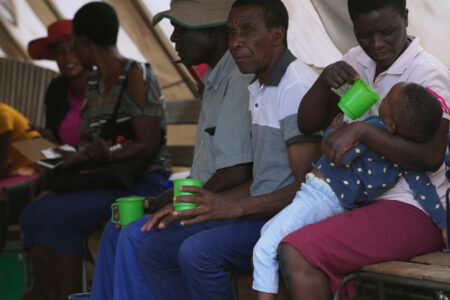
There is a small piece of silver lining in an otherwise very dark cloud. Substantial parts of the world community – governments, businesses, non-profits and individuals – are “dropping tools” to move away from their normal preoccupations and pivoting to address a pressing need associated with COVID-19. It shows that simultaneous, rapid, multi-level and multi-actor emergency response at a pan-global level can be patched together, if the threat is widely perceived as serious and immediate enough.
But if we reflect on the dark clouds that are said to lie ahead beyond COVID-19, some careful thinking now would appear to be a good idea. We can start to learn to avoid or minimize the likelihood of similar global disruptions happening in the years ahead by examining and better understanding the nature and adequacy of COVID-19 responses.
Pivots are defined as reconfigurations of actions, structures and relationships in reaction to changing environments and requirements. But the suggestion made here is that there is value in developing a more sophisticated categorization of the types of pivots in the context of a global crisis. Shallow pivots are temporary “one-off” responses not repeated beyond the crisis. Deep pivots are modest but important changes provoked by a crisis and they remain in place after the crisis is over. Transformational pivots take place when a crisis leads to fundamental re-thinking, direction and action, with significant long-term consequences. Negative pivots result when organizations or individuals respond in a destructive way. Finally, non-pivots are situations when no noteworthy response takes place, it’s more or less “carry on as before”.
Government has unique capabilities in terms of regulatory powers, spending and taxing, and service provision and has used each of them as part of their COVID-19 pivots. Emergency laws prohibiting price gouging are a good example of a COVID-19 regulatory shallow pivot that will be withdrawn after the crisis. Post-pandemic analysis of how these laws are implemented could increase the likelihood of more effective laws being in place for future crises.
To take an example of a COVID-19 regulatory deep pivot, the announced adjustments to increase physical distancing in slaughterhouses fall in this category, since they are likely to remain in place in some form after the pandemic, to prevent re-occurrences of virus transmittals. How government, industry, workers and consumers properly balance the need for safety with the need for a logistically feasible and commercially viable post-COVID-19 production method is the sort of deep pivot public policy decision-making that may not be possible in the heat of an emergency but will likely be of central concern in the longer term.
For an example of a government transformational pivot, if emergency government income payments to workers currently being provided during the pandemic are found to show the feasibility of a targeted universal basic income model over the long term, this could be the impetus for a government transformational pivot, given the broad societal implications on poverty, automation and education of such a change. It is worth recalling that the income tax system now in place started as a temporary war tax response in 1917.
When it comes to COVID-19 business pivots, the first thing likely coming to mind are philanthropic donations of time, expertise, assets, and funds. These are shallow pivots in the sense that donations are likely to be ad hoc acts of generosity that will not be continued over the longer term.
But much can be learned from these shallow pivots. Future studies would be useful examining questions such as the distribution of COVID-19 business donations. In other words, do they favour certain subjects and neglect others? Or examining the quantifiable longer-term benefits to businesses of making donations to determine if firms are “rewarded” by customers for their philanthropy. Results of such studies could lead to the development of an effective donation response in the next crisis.
Businesses may adopt entirely new product lines in response to a global crisis. Depending on whether these new product lines are maintained after the global crisis will determine whether they are characterized as shallow or deep pivots. COVID-19 has raised significant questions about the frailties of global supply chains in times of crisis. Thus, in the interests of having assured supplies of particular products in the future, upcoming government regulations deeming certain products essential, and requiring that they be produced in-country, will play an important role in business decisions as to whether new product lines introduced since COVID-19 are shallow or deep pivots.
The widespread adoption by governments, businesses and civil society of IT-based work-at-home strategies during COVID-19 could create the impetus for a transformational societal pivot given the significant potential effects it could have on commuting behaviour and transportation infrastructure, the environment, urban planning, mental health of home workers and privacy and cybersecurity of home offices.
At all times, the charitable and non-profit sector plays a vital role in Canadian society, across a spectrum ranging from food banks and homeless shelters to hospitals and universities. Their role can be even more critical in emergencies such as the pandemic as they attempt through a variety of pivots to address societal needs – especially for those who are most vulnerable.
For example, in response to COVID-19, the Salvation Army has among other things adopted new physical distancing requirements for its shelters. This is a deep pivot, in the sense that the immediate move to increase the space between beds is likely to be a permanent change. However, as government funding for shelters is currently based on the number of beds provided, the reported effect of this deep pivot could be devastating.
This specific pivot of the Salvation Army is a microcosm of the challenges confronting many in the charitable and non-profit sectors. Facing increased demands and decreased revenues, many are struggling to stay afloat during the pandemic. Emerging from COVID-19, beyond any short term emergency financing gestures, a transformational pivot in terms of funding and new ways of operating would appear to be a pressing need.
A potential COVID-19 destructive pivot would be widespread resistance at the individual level against rules requiring social distancing. Based on the emerging American experience and evidence of similar protests against lockdowns starting in Canada, the likelihood of such resistance increasing across Canada is high. Adolescents may be a particular challenge. Beyond COVID-19, developing a sophisticated understanding concerning capacities for effective crisis social engineering responses to shape inter-personal behavioural change amongst diverse demographic segments is critical.
A non-pivot takes place in two ways: when current practices already align well to a crisis so there is no need to pivot, and it occurs when an organization responds with only small if any adjustments, that may ultimately result in organizational failure. The more we can learn now about how certain organizations have carried on their operations successfully during COVID-19, and the more that these best practices can be shared, the better prepared we will be for the crises that will follow.
When a disruption of the magnitude of the coronavirus pandemic occurs, there is a rare opportunity to re-think and learn from the crisis, to better prepare us for the future. In this regard, thinking beyond the simple COVID-19 shallow pivot is a good place to start.
This article is part of the The Coronavirus Pandemic: Canada’s Response special feature.










